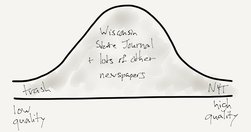Relevant Overviews
- Communication Strategy
- Content Strategy
- Online Strategy
- Online Community Management
- Social Media Strategy
- Content Creation & Marketing
- Online Architecture
- Digital Transformation
- Innovation Strategy
- Communications Tactics
- Psychology
- Social Web
- Media
- Politics
- Communications Strategy
- Science&Technology
- Business

"data-driven journalism doesn’t simply strive to contribute to public policy and culture debates, it aims to end them with a decisive answer. ... In Actually Journalism, news and opinion aren’t needed; to understand something, all the audience needs is this fact, this piece of data, this answer... [but] if Actually Journalism can’t find a way to e…

Great perspective from Ben Thompson on how today's internet flips the bell curve into a power curve, and what that means for anyone producing content which is not best-of-breed: "The implication of news consumption being dominated by the tall skinny part of the power curve is that those who can regularly appear there – the best of the best – are …

A tour of upcoming innovations in "Explanatory journalism... will play a larger role in the digital media landscape ..." illustrate a wider trend: “... content-centric start-ups getting funded. ... web and mobile publishing platforms still present new opportunities for new entrance, new publishers, new journalists, new publications...” - 'FiveTh…
Surprised that after a week this only has about 500 views. Vox.com should be one of the top tech-first news innovators to watch this year

Surprise surprise... "Circa is developing two types of ads: magazine-style full-screen banners, like Flipboard, and sponsored posts... which look and feel like editorial, created by a separate staff.... One future revenue possibility would be licensing access to Circa's article data to other publishers," - News App Circa Looks to Native Ads for Fi…
Excellent overview of a complex topic. Makes me think that a lot of EU communications could benefit hugely from reframing itself as "non-profit news", and considering these questions in depth. Alas, the only interesting debate in this field seems to be limited to the US. "The value of online and offline audience engagement is a question that bot…
Looks like one kind of newspaper has a long future - the worst kind: "Supermarket tabloids have long been an icon of unreliability, largely because of their outrageous claims and sensational, melodramatic design. But when individual pieces are shared via social media, these visual and context clues are typically stripped out... Without this conte…

Is data journalism just another opportunity to bamboozle an audience? Surely publishing the data in interrogable form would be the answer? "data give commentary a false sense of authority since data analysis is inherently prone to bias. The author’s priors, what he believes or wants to be true before looking at the data, often taint results that …

A pretty good idea of where news & journalism will be in 5 years, or deja vu all over again? "the organizations worth backing must be run by tech savvy, top-notch people focused on social distribution of stories that serve an existing but underserved niche audience. ... “They are all technology companies first ... understand how people utilize t…
"“In the old days, the few big newspapers were so profitable they could run desks on most of the most important issues in the world. Now, as the news landscape fragments, investigative journalism often takes place in nonprofits... " - Upworthy partners with ProPublica and advocacy media groups on original content » Nieman Journalism Lab
@Poynter's piece seems fair. While it's true that "rebundling of news is booming. New aggregation sites with a social media twist, led by BuzzFeed, are working ingenious variations on the first wave like The Huffington Post..." ... and that if everyone in the world had a smart phone and an iPad, the global news market will grow rather than shri…

Interesting perspective on the rash of new tech-content hybrids emerging in the media space. Back in the day, companies could be either tech or content, but not both: "What were you going to be really good at? Engineering or “content”? You couldn’t do both, because that would mean that one would be subordinate to the other. And if you were going…
"We don’t write articles. We tell stories and those stories persist over time... Each story is comprised of fragments ... stitched together to create a story. In many ways circa represents the next step in the atomization of news ... allows people to read stories and identify new developments faster ... and makes it possible to dig deeper by lin…

worth repeating for everyone who thinks that the path to democracy in the EU is measured in column inches...
"“Fished out of the shadows, old news coverage in China’s media can provide clues to the family connections of government officials as reporters investigate their financial dealings.”"

Oh dear. "Andreessen mentions the “Chinese wall” that many media entities maintain between the business side and the editorial side. This approach is flawed, he says: “No other non-monopoly industry lets product creators off the hook on how the business works.” Many businesses, Andreessen argues, manage to balance incentives and conflicts and ca…
Original linkTonight I'll be toddling along to Grilling Kippers, a UKIP-focused anti-Eurosceptic campaign from deep within the Brussels Bubble.

Les Echos looks to be doing what I have long dreamed to do for the bloggingportal reboot - deploy semantic analysis to aid content discovery and to underpin a new wave of media and comment. But do we have to call it an 'aggrefilter'? "Les Echos launches its business news aggrefilter ... to gain critical working knowledge of the semantic web." …
“The best explainers are direct, concise and easy to understand. But investigative journalism is rarely any of those things, instead reflecting the messiness of real life… explanation is just the beginning, a gateway into the deep-dive…”

Damn, some of these ideas I implemented 12 years ago for the EC's thematic architecture. Nice to see them in a different context: First, the problem with current news journalism: "The column inches devoted to the new are column inches not given to the important... this stress on novelty is a holdover from when the cost of making and moving paper …
A Storify on 8 possible business models for journalism from Marc Andreessen (Cofounder of Netscape, now VC at a16z). Highlights: (6): "We already see the rise of new kinds of aggregators in the wake of the great unbundling of newspapers & magazines. Signal-to-Noise: "quality can easily coexist with crap. All can thrive in respective markets.... …

Sobering reality check on new journalism ventures which: "...from a business perspective, hardly be worth commenting on, except for the fact that the people doing the commenting — other journalists — believe that perhaps, in a declining profession, this could be a new life. It's journalism-centricity to a particular myopic degree.. an extreme exa…
Nice NYTimes tour of the current news startup wave: Key point: "quality, customized advertising on sites with good editorial content was actually a solid business with growing margins... Business Insider has had nine consecutive quarters where the revenue per page was rising.... “There are fundamental secular trends — ad growth, mobile growth, pa…

Looking forward to geeking out: Info architecture: Guessing some serious cardsorting went into this off the cuff remark: "the new FiveThirtyEight will provide coverage of five major subjects: politics, economics, sports, science, and lifestyle. By design, almost any topic in the news can potentially fit into one or more of these categories. " A…

Interesting points emerging from the first two articles I’ve seen about Jason Calacanis’ his new venture, Inside.com.

Medium on how magazine editing is morphing as technology transforms online longform: "Online, each story is at best its own magazine, sent out to find its own temporary audience. One article may absorb people who subscribe, or would once have subscribed, to Foreign Affairs; another might absorb devotees of Wired or Men’s Health or Glamour. The au…
NYTimes.com on how legacy organisations failed to go digital, leaving field open to tech-first startups: "Vox is a digitally native business, a technology company that produces media, as opposed to a media company that uses technology. Everything at Vox, from the way it covers subjects, the journalists it hires and the content management systems …
Last Thursday I finally caught up with Eric Maurice of PressEurop, which recently had its plug pulled by the EC following their decision to cancel its renewal tender some weeks after publishing it.

Apparently, and hopefully, we're seeing: "the end of a print media era defined by high-brow broadsheets and low-brow tabloids. Today, the idea of what constitutes “respectable” media is in flux as the online heirs to the tabloid tradition produce more quality stories and traditional outlets like the New York Times even look to them for inspiratio…

Nothing new, but then it's 2013 review time: "this was the year someone isolated the DNA of the viral story, and the world ... saw for the first time the awesome potential of viral content ... Upworthy had about seventy-five thousand [Facebook] likes per article, twelve times more than fourth-place BuzzFeed. Among them were posts like the one wh…
Relevant Overviews
- Communication Strategy
- Content Strategy
- Online Strategy
- Online Community Management
- Social Media Strategy
- Content Creation & Marketing
- Online Architecture
- Digital Transformation
- Innovation Strategy
- Communications Tactics
- Psychology
- Social Web
- Media
- Politics
- Communications Strategy
- Science&Technology
- Business